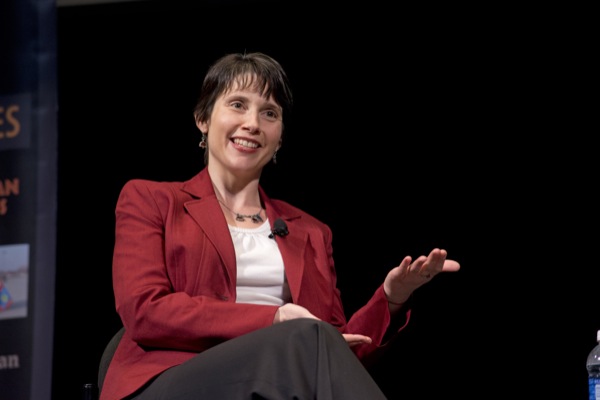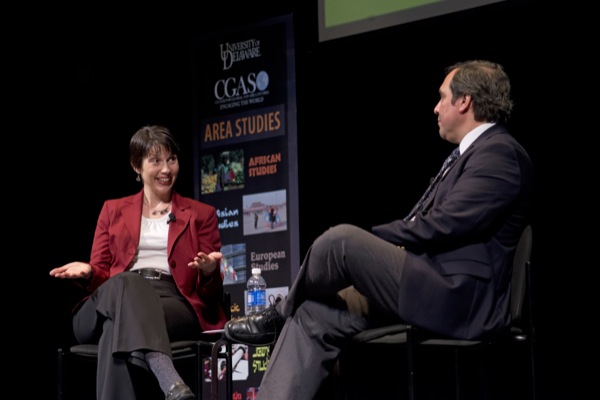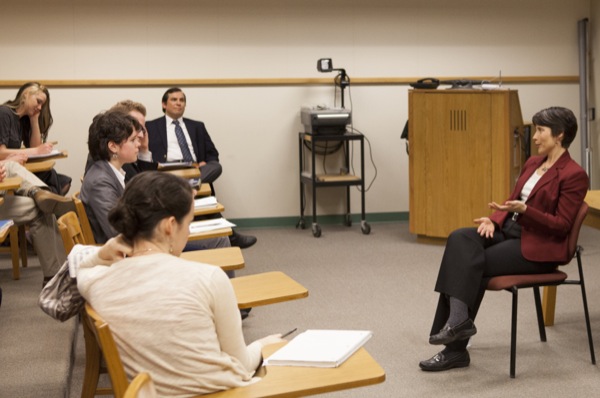Global Agenda
Atlantic Council's Danya Greenfield discusses 'Arab Spring and Beyond'
4:23 p.m., March 13, 2014--Since the first uprising in Tunisia in 2010, the Middle East has seen its share of revolution, challenge, a wave of unrest and popular protest.
Despite the challenges and turmoil these countries face, there is hope, and more importantly the long term process of transition is underway, Danya Greenfield, acting director of the Atlantic Council's Rafik Hariri Center for the Middle East, told a University of Delaware Global Agenda audience Wednesday night in Mitchell Hall.
Global Stories
Fulbright awards
Peace Corps plans
Greenfield, a democracy and governance specialist with extensive experience in the Middle East and North Africa spoke on the topic, “The Arab Spring and Beyond.”
She discussed the complex democratic processes in the Middle East and the challenges this process faces today, specifically highlighting four countries -- Egypt, Libya, Tunisia and Yemen.
In these countries and others there was violent rebellion, negotiated behavior, intense euphoria and then disappointment, mismanagement and corruption, said Greenfield.
These overwhelming factors led to common elements and themes for change including social justice, responsive government and economic growth.
There are five key themes Greenfield believes summarize the reason for change in the Middle East. First, there was a quest for dignity; people began to reject government humiliation and corruption.
Second, economic despair and considerations played a huge role in the convergence of economic and political factors. This was followed by a breakdown of the “social contract.” The people’s belief in the ability of their government to provide adequate social services began to erode. When over-crowded classrooms became a daily occurrence, among other issues, the people were no longer willing to turn a blind eye to such matters, said Greenfield.
Another theme mentioned by Greenfield was the demographic explosion in Middle Eastern and North African countries housing the largest number of youth under the age of 35, with many facing limited employment opportunities.
Finally, Greenfield said there was a tendency to overemphasize the importance and role of social media. She said it was not the cause for the uprisings but rather a facilitating tool.
Where do things stand now?
Greenfield said Tunisia is experiencing a, “genuine democratic transition most likely to succeed.” Tunisians, being the geographical starting point of the Arab Spring, have learned to compromise in their request for political change, realizing that politics is not a zero sum game and cooperation does not mean failure.
According to Greenfield, tension between religion and state continue to exist but success primarily depends on being able provide enough jobs to sustain the growing youth population. She said the country’s “trajectory looks relatively positive,” due to the relative small population, high levels of literacy, secular outlook and high record of women’s inclusion.
As for Egypt, it will continue to face hardships associated with transition. Elections in 2013 provided a stunning victory for Islamic parties but the July 3 coup d’état indicated the future of Egypt is still up in the air, said Greenfield.
Libya lacked rudimentary structures, said Greenfield, and there was an absence of real leadership.
“Somehow the country needs to come around to the constitutional process,” said Greenfield.
Greenfield writes frequently about Yemen and said, “The negotiated transfer of power avoided a blood bath in civil war but did not resolve any of the underlying issues.”
Despite months of youth demonstrations, Greenfield said issues could not fully be resolved because of behind-the-scenes maneuvering.
All of these countries have common trends, said Greenfield. The elite of the former regimes desperately try to restore control. While outwardly they may relinquish their positions, behind the scenes many try to remain in positions of influence and political power.
Moreover, the role of Islam remains unclear amidst the turmoil of changing governments.
Finally the success, rise, and fall of the countries will be based on their economies. If they lose popular support without improvement in the daily lives of people, unrest will continue. Countries like Egypt can no longer rely heavily on tourism as a source of income and large oil reserves in Libya still remain a source of tension.
Greenfield said there have been significant political gains since 2010, and reform, not necessarily democratization, could be the answer.
“Each country will chart their own course,” said Greenfield. “There are calls for change that will not dissipate unless demands from the revolution are addressed. It is a gradual and frustrating process but is the only viable alternative for a longstanding future for the Arab world.”
Greenfield was able to fit a great deal of information into her limited presentation, but the question and answer portion provided her and the audience the ability to delve deeper into issues such as economic assistance fostering investment and trade rather than aid, U.S. promises and disappointment felt by the youth, absorptive capacity, dignity verse justice and more.
“A country by country approach needs to be taken,” said Greenfield.
Global Agenda: The class
Students taking the Global Agenda class POSC/COMM 444, to which Greenfield spoke prior to the evening lecture, were able to learn about her personal journey.
In class, Greenfield spoke to students about her experiences and what encouraged her to be where she is now. She told students about how she found her interests in college and began getting involved. After graduating she took a three-year break, traveling and living abroad before returning to the U.S. for graduate school.
Students were intrigued by her travel, her world views, and her experience with different cultures and governments.
"It was interesting to hear how much time on the ground she spent gathering research," said Elizabeth Gibson, a senior public policy and international relations double major.
Greenfield spoke of the different democratic levels of each country and the uniqueness and care it takes to teach people a way of doing things as an outsider. She told students when countries step in to aid another countries, the differences in advancement, cultures and customs need to be accounted for.
"Each country is in a different place in democracy and the U.S. can help them in their path to becoming more democratic," said Chelsey Rodowicz, a senior communications and international relations major.
Students listened to Greenfield speak about U.S. experts assisting countries, demand-driven changes, and responsive governments. She told students that the way the Atlantic Council ranks its effectiveness and progress is based on whether its concepts, ideas and written work get in front of policy makers and government officials.
“[The Atlantic Council] is less limited being a non-government and not partisan organization,” said Kait Houser, a senior Spanish and political science major. "I would love to be able to do that advocacy and work with government officials from different governments."
Tips Greenfield provided students were to invest time building language skills, build relationships and network with people you can learn from over time.
The Global Agenda class is taught by Julio Carrión, director of the Center for Global and Area Studies and professor of political science and international relations, and director and moderator for Global Agenda.
Global Agenda continues, with schedule change
The Global Agenda series, whose theme this year is “Global Demands, Regional Responses,” continues on Tuesday, March 25, with speaker Sir Peter Westmacott, British ambassador to the U.S. This talk was previously scheduled for Wednesday, March 26.
All the talks begin at 7:30 p.m. in Mitchell Hall and are free and open to the public.
Global Agenda is presented by the Center for Global and Area Studies and sponsored by the Institute for Global Studies, the Center for Political Communication, the Department of Communication and the Department of Political Science and International Relations.
Article by Elizabeth Adams
Photos by Duane Perry and Ambre Alexander Payne













